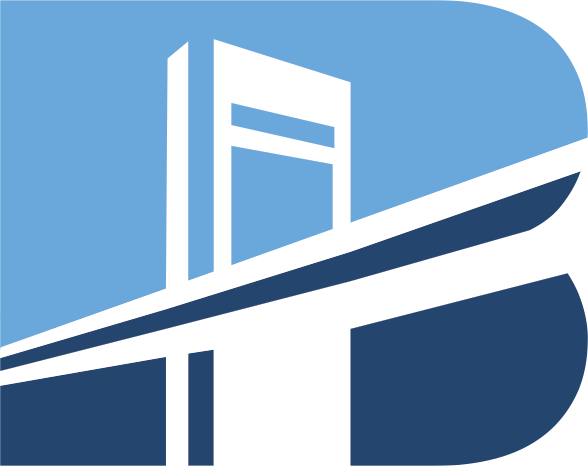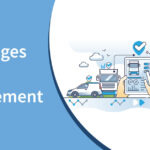5 Tips For Growing Your Towing Business
Drive Your Towing Business Forward: Proven Tips for Sustainable Growth
Operating a towing business can be challenging. Calls come in at all hours of the day and night, customers aren’t always pleasant to deal with, and working in all weather, at all times of day and night, can lead to injuries.. However, the benefit of owning a towing business is it’s an essential service, making it less susceptible to recession effects and seasonality, with a constant flow of business. In this article, we’ll share 5 tips to help you grow your towing business: optimizing your business costs, upgrading your fleet, marketing your towing company, and identifying new clients.
Optimize Your Business Costs
By reviewing your financial expenses, there may be opportunities to optimize your business costs. Cutting down non-business-essential costs can free up money to be reinvested in other ways, such as purchasing a new truck.
To effectively review business costs, it helps to keep good financial records. If you’re not already utilizing accounting software or a bookkeeper, you should have a balance sheet, income statement, and cash flow statement. The income statement will show you the costs and expenses your towing business incurs to earn revenue. Additionally, some business accounting software programs include budgeting tools to help you track and categorize expenses. This can be a helpful way to identify certain categories that take up a disproportionate amount of your budget.
For example, you may want to review the following expenses. How much did they increase year over year? Are your costs in line with the industry average?
- Insurance: Commercial Auto, Liability Coverage, Collision, Medical Payments, Uninsured/Underinsured Motorist, Garagekeepers Legal Liability, On-Hook Towing, and/or Tow General Liability.
- Employee Wages: The mean hourly wage is $22.52, according to the U.S. Bureau of Labor Statistics.
- Benefits: Insurance, retirement plans, and any other benefits you provide for yourself and your employees.
- Regulations: Includes the cost of commercial driver’s licenses (CDLs), state and local business licenses or permits, and any other costs associated with complying with the regulations in your area.
- Fuel: The cost of diesel can fluctuate throughout the year. AAA shows state gas price averages, which can help you evaluate your fuel costs.
- Repairs and Maintenance: Taking good care of your trucks will help you keep costs down in this category, but still some spending on repairs and maintenance is inevitable.
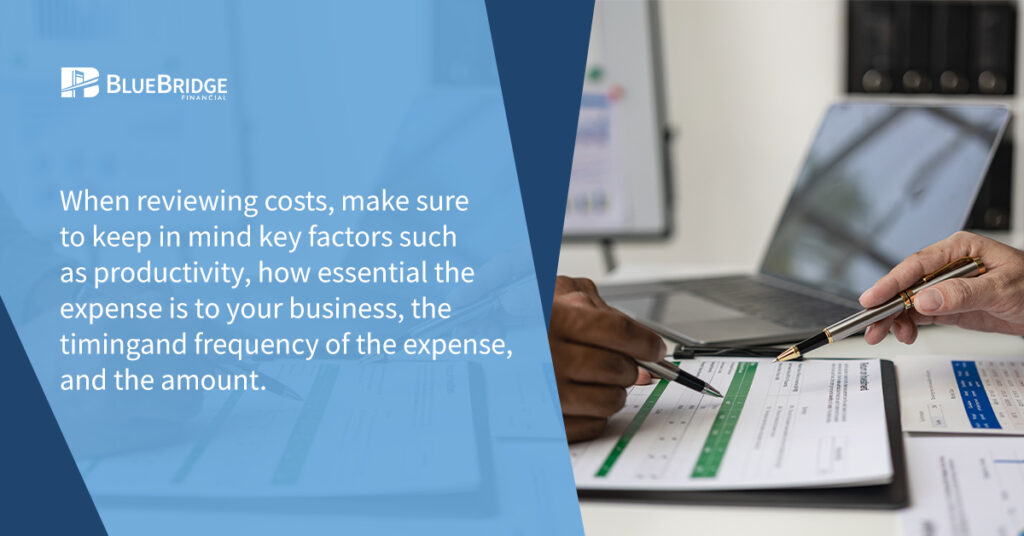
Next, look at your cash flow statement to see how money is flowing in and out of your towing company. Which time of year is your busiest? Depending on where you’re located, this might be the winter. Which time of year is the slowest for your business? And when are your costs highest?
Review your contracts with suppliers, service providers, and vendors to make sure you’re getting the best possible deal. It’s also a good idea to meet with a tax professional once a year to ensure you’re taking advantage of all tax deductions and costs you’re eligible for, such as depreciation.
Upgrade Your Fleet
Once you have reviewed your business expenses, you should consider investing in new equipment. Every quarter, assess the following factors of your towing fleet:
- What is the age and condition of your vehicles?
- Where are your vehicles in their useful life cycle of depreciation? This will help you forecast how much value is left in your fixed assets when exploring new expenditures of upgrading your fleet.
- Have you considered upgrading to a used truck instead of buying new? Research the latest towing vehicles and technology to determine whether buying new is required.
- Does your fleet need to be expanded? Consider upgrading to different types of tow trucks such as flatbeds, wheel-lifts, or wreckers.
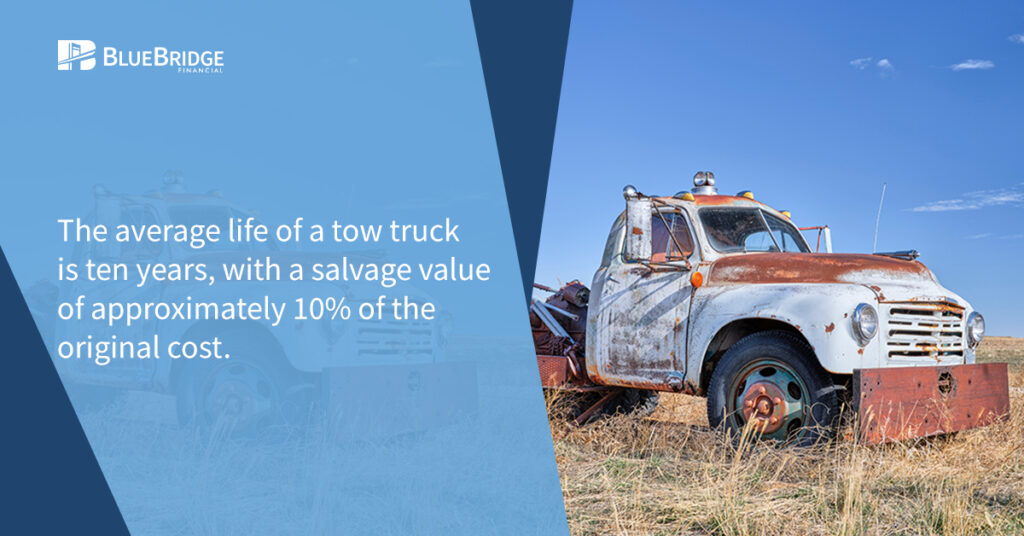
Market Your Towing Company
Towing can be a competitive industry, especially if you want to win contracts with law enforcement, property management companies, municipalities, and more. In addition to marketing, you need to network and build relationships with your desired clients. Keep your company’s name top of mind for the next time a tow is needed.
In addition to traditional marketing strategies, you should leverage digital marketing to make your business accessible to as many people as possible. The best towing company marketing tips include:
- Use Google My Business to claim, optimize, and interact with your customers.
- Create social media accounts to engage with your customers, make yourself visible, and humanize your business for future clients. Ideas for posts include tips about vehicle maintenance and security, customer stories, and employee profiles.
- Pay Per Click advertising can put your business at the top of search results when someone is searching for towing assistance on their phone.
- Make sure your website is SEO-optimized to rank higher in local organic search results.
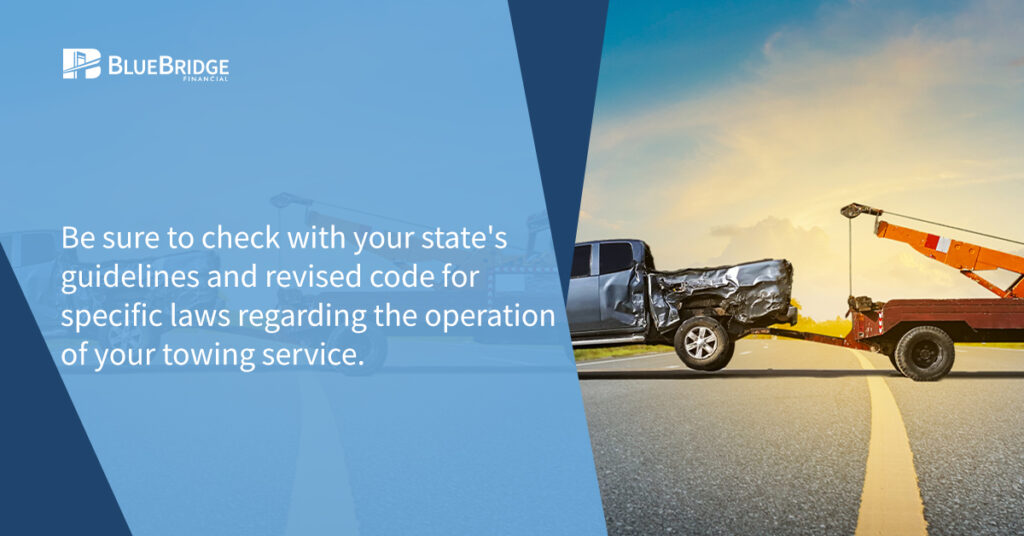
Stay Up to Date with Licensing and Regulations
Of course, you can’t grow your towing business without staying on top of basics like licensing for your business and operators. This includes CDLs and, depending on the size of your trucks, permits for oversized vehicles. You can find information on the different Classes of CDLs here and state information on oversize or overweight vehicles here.
Towing companies also need multiple layers of insurance such as:
- Employee health insurance, disability, unemployment, and workers’ compensation
- Insurance for your vehicles
- Property insurance for any facilities and equipment
- Small business insurance
- On-hook insurance to cover damage to vehicles you’re towing or hauling
- Garage Keepers insurance for vehicles stored at your repair shop or facility
Identify New Clients
Finally, growing a towing business often means finding new clients and contracts. Perform market research to ensure you are growing your clientele. While local law enforcement, municipalities, and large corporations may already have contracts with existing companies, you can keep your business top of mind as an alternate when they need one. In the meantime, think about building relationships with apartment complexes and new businesses looking to enforce private parking.
To grow your relationships with existing clients, consider implementing a referral program. This rewards your customers for referring new business to your towing company. You should also pay attention to online reviews and encourage happy customers to rate their experience on platforms like Google, Yelp, and Facebook. Make it easy for them by texting or emailing a link or including a QR code on a business card, for example.
Get involved with your community by sponsoring sports teams, showing up for local events, and volunteering or making charitable donations. As people recognize you and your business name, they will remember you the next time they need towing services.
About Blue Bridge Financial
Founded in 2009, Blue Bridge Financial is a specialty equipment finance firm providing small and medium-sized businesses with secured loans for revenue-producing, essential-use equipment.
Ready to add new or used tow trucks to your fleet? We are your towing equipment financing expert, having funded over 9,000 businesses in 30+ industries. We can fund your towing business, too!
Our flexible loan programs and competitive rates are tailored to your needs. There are no age or mileage restrictions and we work with private party sellers. Get your funds fast with same-day loan approvals. You can also defer your loan payments for 90 days with our deferred payments program. Contact us today to learn more.
Any Questions? We'd Love to Talk:
About the Author
Nick Devernis is the Vice President of Business Development with expertise in credit analysis and equipment financing. With over 6 years in equipment financing, he offers a wealth of knowledge to readers of Blue Bridge Financial’s blog. He currently oversees the California office and leads the Sales and Marketing departments. Nick’s role as Vice President of Business Development involves management of the sales team, relationship management, and developing strategic partnerships to drive inbound and outbound originations.p> LinkedIn Profile
